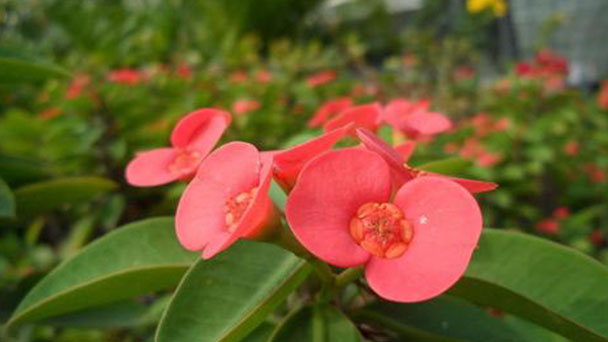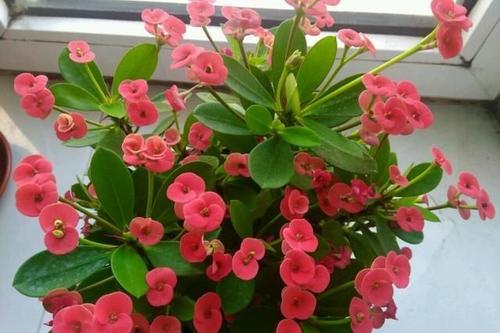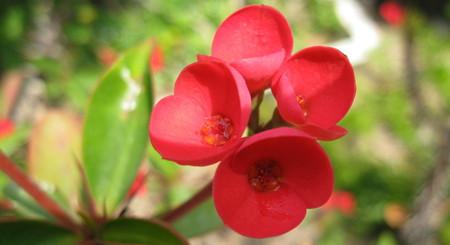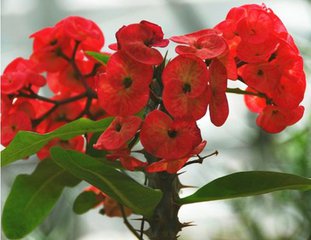Crown of thorns profile
Written by Maggie
Sep 09 2021

Crown of thorns - like plants of the Euphorbia family, known as Euphorbia splendens or E. milii. Native to Madagascar, this popular houseplant is grown in gardens in the tropics. Flowers bloom all the year round, most in winter in the northern hemisphere.
Crown of thorns picture

Crown of Thorns - Most Common House Plant
Crown of thorns features
Crown of thorns is an upright or slightly climbing shrub, 1-2m in height, many branches, with white pulp in the body.
Stems and branchlets are angulate, furrows shallow, densely tapered, spines 1-1.5 (2.0) cm long, 0.5-1.0 mm in diameter, often arranged in 3-5 rows on the ridges, rotating. Leaves are alternate, often densely at the apex of new branches, obovate or oblong-spatulate, 1.5-5 cm long, 0.8-1.8 cm wide, apex rounded, apically apiculate, base tapered, entire, smooth, bright green; Sessile or nearly sessile; Stipules of Crown of thorns are subulate, caducous.
Inflorescences 2, 4, or 8 in dichabate compound, born in upper leaf axils of branches; Compound inflorescences stipitate, 4-7 cm long; Crown of thorns has 2 bracts, kidney round, bright red above, pale red below, close to the inflorescence;Involucre campanulate; Crown of thorns has some male flowers several, 1 female flower.
Planted in the garden in the tropics, the flowers bloom all the year round, and bloom most in winter in the northern hemisphere. The flower shape is beautiful and ornamental.
Crown of thorns origin of habitat
Crown of thorns is native to Africa (Madagascar), widely cultivated in the Old World tropical and temperate; It is cultivated in both northern and southern China and is commonly found in parks, botanical gardens and courtyards.
Crown of thorns growth habit
Crown of thorns likes warm, humid and sunny environments. Crown of thorns is slightly shade tolerant, but afraid of high temperature, drought tolerant, not cold resistant.With loose, good drainage leaf rot soil for the best. If the temperature is low in winter, there is a short-term dormancy phenomenon. Crown of thorns is widely cultivated in the tropics and temperate regions of the Old World; It is cultivated in both north and south China.
Crown of thorns propagation method
The Crown of thorns is used to cuttage nutrient soil or river sand, clay soil and other materials. It is difficult to get an ideal substrate for family cuttage due to limited conditions. It is recommended to use the cutting substrate which has been prepared and disinfected. Medium-coarse river sand is fine, but rinse with clean water several times before use. Sea sand and saline areas of river sand are not used, they are not suitable for the growth of flowers and plants. Crown of thorns in cuttings. The whole growth period can be cut, but in 5-6 months is the best, the survival rate is high, the cutting Crown of the easiest to survive. Choose thick branches of Crown of thorns, about 10 cm long and 15 cm (will take three or four leaf), dry white pulp from the slit is coated with plant ash, dry in the shade, and solstice make wound dry and then insert the grain of sand, water flooding, less water, after stay basin soil slightly when pouring, about after 50 days to 60 days to take root.

Crown of thorns growing methods
Soil
When the seedlings of Crown of thorns are loaded into the pot, first put 2-2 cm thick coarse grain matrix or ceramsite as a filter layer on the bottom of the pot, sprinkle a layer of fully decayed organic fertilizer as a base fertilizer, about 1-2 cm thick, and then cover with a layer of substrate, about 1-2 cm thick, and then put the plant, to separate the fertilizer from the root system, to avoid root burning.
The substrate for Crown of thorns used in the upper basin can be selected from one of the following. Garden soil: slag = 3:1;Or garden soil: medium river sand: sawdust = 4:1:2; Or paddy soil, pond mud, leaf rot soil in one kind. Or peat + perlite + ceramsite =2 +2 +1; Garden soil with slag =3 parts +1 part; Peat + slag + ceramsite =2 copies +2 copies +1 copies; Saw dust + vermiculite + medium river sand =2 parts +2 parts +1 part. Pour a permeable after the basin, and put in a slightly shade environment maintenance for a week.
Watering
Crown of thorns is drought resistant, water should not be too much, if the pot soil is too wet for a long time, not only cause root rot, but also endanger the survival of the plant, so usually watering to the pot soil is a little dry as well.Summer moisture evaporates fast, watering needs some more appropriately, but cannot seeper inside the basin. Watering too much in the Crown of thorns flowering period will cause falling flowers and buds, and even cause root rot.
In the season of high temperature, Crown of thorns often enters a dormant state, and requires little fertilizer and water, and even controls fertilizer and water. The interval period is about 3-5 days for outdoor maintenance and 4-7 days for indoor maintenance. Watering time to try to arrange in the morning or evening when the temperature is low. Spray the Crown of thorns often.
Fertilization
Fertilizer should be used sparingly. Apply thin fertilizer 2-3 times a year in spring for Crown of thorns. Fertilization can be reduced in autumn. The growth period is generally 3-4 weeks at a time of the decomposition of thin cake fertilizer water. Too much fertilizer, especially too much nitrogen fertilizer, the branches are long, only long leaves without flowering. In the pregnant bud stage of Crown of thorns, add 1-2 times of phosphorus, potash fertilizer, flowers, and colorful.
Light
The resulting sunlight should be abundant at all seasons of the year. During the flowering of Crown of thorns, the bracts are brightly colored and the flowering period is long with ample sunlight. Sunlight is insufficient, color is dim, if placed under shaded condition cultivation for a long time then do not blossom or rarely blossom. The resulting warmth is not a result of coldness.Northern areas generally in early May out of the room, placed in the sun, in early October into the room, put the indoor place with sunlight.
The leaves of Crown of thorns will be more beautiful in the summer when they are preserved in half shade or 50% shade. In spring and autumn, because the temperature is not very high, it is necessary to give it direct sunlight, in order to facilitate the accumulation of nutrients for photosynthesis. In winter, put in the place with bright light indoor maintenance. Put Crown of thorns in indoor maintenance at ordinary times, should be put in southeast to the door window nearby, in order to be able to receive the light, and every pass a month or a half month, want to move outdoor maintenance 2 months, otherwise leaf grows thin, yellow, new branch or leafstalk fine, internode elongate, be in long condition.
The temperature
During the winter, when the room temperature is low, the leaves of Crown of thorns fall off completely and enter the semi-dormant state. At this time, watering should be strictly controlled and the basin soil should be kept dry. Crown of thorns will die from freezing when the temperature is below 0℃. If the room temperature in winter can be maintained above 15℃, the whole winter flowers. The Crown of thorns indoor flowers are most suitable for autumn and winter growing in the north.
Trim
Proper pruning is the most accurate of the resulting blooms at the top of the branches of Crown of thorns. To allow Crown of thorns blooms, appropriate pruning is essential. Because the main branches are too long, there are fewer flowers. Should be in so after the flowering period will be too long and the branch that grows not neat is cut short, grow below the cut mouth of the branch generally 2 new branches, when new branches grow 5~6 centimeters can blossom. Prune once a year and in a few years the whole plant will be covered with bright little red flowers. As a result of branch slender softer, grow up along with the plant, usable bamboo stick or iron wire tie the bracket of different shape, pull branch bind its go up, make make style, can show the beauty of safflower green leaf more when flowering.If do not prune in time, let its grow naturally, its main branch can grow more grow more, not only flowering is little, and plant form is not beautiful also.
Crown of thorns flower language
Crown of thorns flower language is stubborn and steadfast, gentle and loyal, brave and elegant.

Latest Updated
- Benefits of Bugleweed - 7 Science-backed Health Benefits
- Bugleweed Dangers & Side Effects - Is It Poisonous?
- How to Plant Evergreen Trees - What You Should Know
- When to Plant Evergreens - Grow Guide for Evergreen Trees
- 12 Wonderful Evergreen Shrubs for Your Garden
- 12 Popular Evergreen Plants with Pictures for Beginners
- When And How To Prune A Lilac Bush Like a Pro
- How to Grow & Care for Lilac Vine (Hardenbergia Violacea)
- Japanese Lilac Tree (Syringa Reticulata) Care & Propagation Guide
- Shumard Oak Pros and Cons - What to Know
Popular Articles
- Winter maintenance of Antirrhinum Majus
- How to Grow Terminalia Mantaly Tree
- How to Grow and Care for Crossostephium Chinense
- How to grow Antirrhinum Majus in spring
- Peristeria Elata (Dove Orchid) Profile: Info & Care Guide
- Underwatered Snake Plant (Sansevieria Trifasciata) - Signs And How To Fix
- How to Care for Brazilian Jasmine Plant (Mandevilla Sanderi)
- How to Grow & Care for Graptopetalum Purple Delight in Summer
- Rosa Chinensis (China Rose): Plant Growing & Care Tips
- How to Care for Baby Sun Rose (Aptenia Cordifolia)